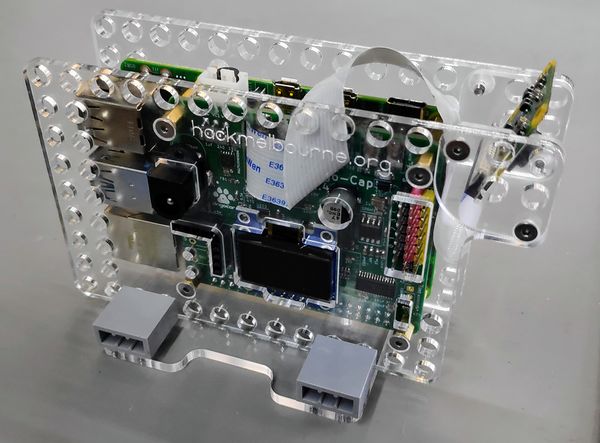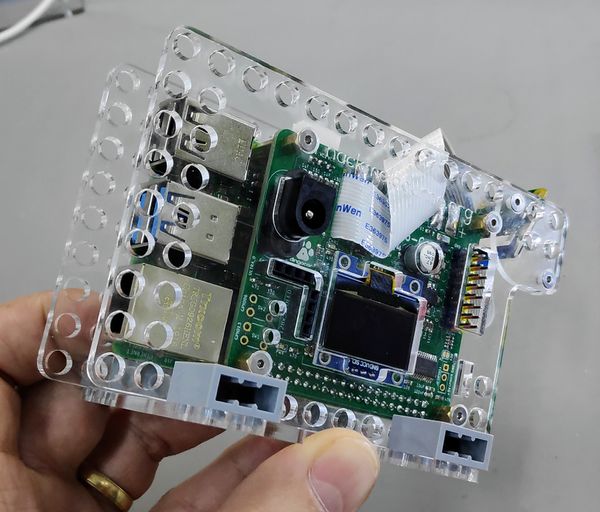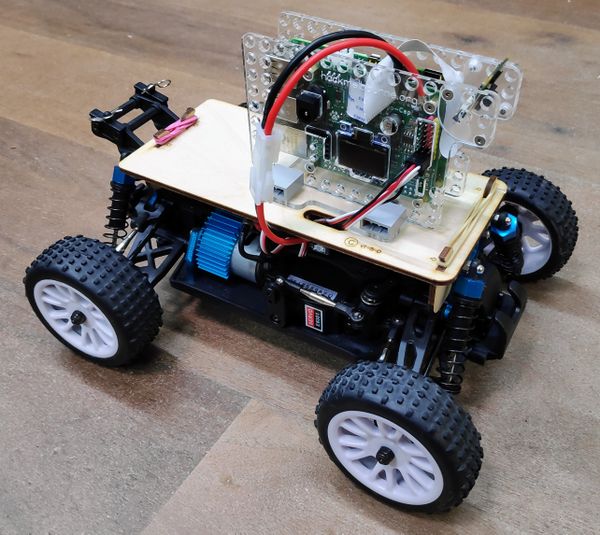OHMC2020
Move over Cybertruck, in 2020 we're building self-driving DingoCars!
The Open Hardware MiniConf (OHMC) is a 1-day event that runs as a specialist stream within the linux.conf.au conference.
Interest in Open Hardware is high among FOSS enthusiasts but there is also a barrier to entry with the perceived difficulty and dangers of dealing with hot soldering irons, unknown components and unfamiliar naming schemes. We use the assembly project as a stepping stone to help ease software developers into dealing with Open Hardware. Plenty of instructors will be on hand to assist with soldering and demystifying any questions around hardware assembly.
NO PRIOR HARDWARE EXPERIENCE REQUIRED! That is, after all, what this session is all about! To get the most out of this, some basic knowledge of Linux commands will be helpful. (ssh, running commands, navigating the filesystem)
Participants learn hardware skills by assembling their own electronic project which includes soldering and understanding how circuits work, as well as hearing interesting talks about various projects and techniques related to the morning project and to open hardware in general.
Contents
Before the day
Registration and cost
To attend you must register for the main conference, which provides the venue. The Open Hardware Miniconf is part of LCA as a specialist stream for conference attendees: it's not a stand-alone event. See linux.conf.au for more information.
LCA 2020 will be held at Broadbeach, Queensland, Australia.
We typically also charge an additional amount for participants undertaking the assembly project to cover the cost of the materials. This is usually around $150-$200. There is an extra registration form that needs to be completed to enrol for the hardware build. Space is limited so get in fast!
All registered LCA attendees are welcome to come along and watch, or attend the talks, without additional registration.
Where is it?
Tuesday January 14, Room 8.
What to bring?
A laptop that has an SSH client.
Want to present?
We have slots for 30 minute talks, as well as 5 minute lightning talks.
Submit your talk proposal on the LCA open hardware miniconf page.
Got something to share about your experiences with Open Hardware or Maker life? New to open hardware and want to tell us your achievements? An old hand and want to tell us your gritty stories of failures, successes and lessons learned? Not sure if your idea is suitable? Submit it anyway and we can talk with you about whether it'll fit in.
On the day
The miniconf is split into morning and afternoon sessions.
Morning: build your own DingoCar friend
In the morning, the hands-on assembly session lets participants assemble a special hardware project developed for the miniconf. For 2020, the project will be a DingoCar! Building it lets you the assemble the hardware and then experiment with the software.
Afternoon: talks and further discussions
The second part of the day will be presentations about Open Hardware topics, including information on software to run on the hardware project built earlier in the day.
Schedule for the day
| 10:40 - 12:20 | Assembly Workshop (registration required to participate, spectators also welcome) |
| 12:20 - 1:30 | Lunch |
| 1:30 - 1:55 | How the Perception Module hardware works: John Spencer |
| 1:55 - 2:20 | Running Tensor Flow on the Perception Module: presenter |
| 2:20 - 2:45 | topic: presenter |
| 2:45 - 3:10 | topic: presenter |
| 3:10 - 3:50 | Afternoon Tea |
| 3:50 - 4:15 | topic: presenter |
| 4:15 - 4:40 | topic: presenter |
| 4:40 - 5:30 | Lighting Talks (5 minute blocks) |
Assembly Project: Perception Module and DingoCar
Each year we help attendees build a project specially developed for the Open Hardware Miniconf.
The project for 2020 is the Perception Module, a flexible TensorFlow platform that you can build into your own machine-learning projects.
It includes a Raspberry Pi 3B+, a camera, onboard power management, support for both NiMH and LiPo batteries, servo outputs, a 128x64 pixel OLED display, NeoPixel output, and connections for a sonar sensor.
The Perception Module is a direct descendent of the project from OHMC2019, with the brains of the Donkey Car encapsulated in a self-contained module that even has Lego-compatible holes to help you build it into your own projects.
At the OHMC we will assemble our own Perception Modules and then fit them onto converted R/C cars to build the delightful DingoCar, a machine-learning self-driving car.
DingoCar is a fun project but it's only one example of how you can use the Perception Module. After the event you can take your DingoCar and Perception Module home with you, and either continue to use them together or build other projects of your own around the Perception Module.
Some things are pre-built (a custom board to hook up to the Raspberry Pi that has connections for the camera, the servo motor for the engine and the steering) and we'll be attaching some components to the board using soldering, wiring, magic and luck.
The hardware kit includes:
- RC car chassis
- Raspberry Pi model 3+
- Raspberry Pi Camera
- Custom chassis parts for mounting
- Voltage regulator, PWM output controller, and other required parts
We'll then connect wirelessly to train the car by driving it around a track, then once the computer has processed this model data, we will unleash our DingoCars to drive themselves!
Yes, you will need your own laptop to participate in the assembly project to handle the training and control of your DingoCar. Setting some items up in advance will give you more time in the session for the hardware, and provide some relief to the conference wifi.
Full OHMC2020 Software instructions provide more information about the workshop.
Credits
OHMC is mostly run by Andy Gelme and Jon Oxer, with able assistance by their team of robots. 2020 also has the following human assistants: John Spencer, Andrew Nielson, Bob Powers and Nicola Nye. We also rely on a big team of helpers on the day who provide hands-on guidance to attendees, teaching assembly techniques and soldering, and answering questions.


